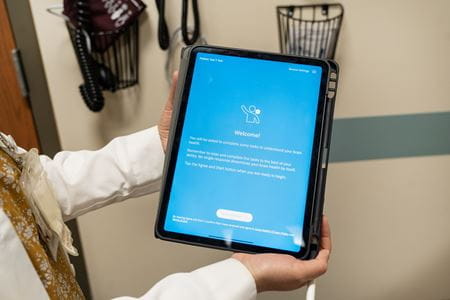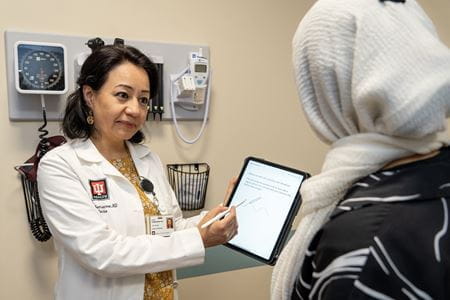INDIANAPOLIS — A trio of studies led by Indiana University School of Medicine researchers found digital testing during primary care visits showed some promise as a tool for early identification of Alzheimer's disease and dementia in older adults.
The first study, recently published in the Annals of Family Medicine, offered a five-minute digital screening through an iPad app to every patient 65 years or older at seven primary health clinics across Indiana. Of the 1,808 tests administered, nearly 14% tested as cognitively impaired and were referred for further screening.
Those whose test results showed impairment received a follow-up exam within 90 days. About 2% of these patients received a new Alzheimer's or related dementia diagnosis, while 5% were diagnosed as mildly cognitively impaired. About 63% were referred to IU Health's Brain Health Navigator program, which further screens for early dementia signs.
A companion study, also published in the Annals of Family Medicine, engaged clinicians across the seven clinics to use the digital assessments. Four Indiana clinics fully adopted the program.
A third study, published in the Journal of Internal Medicine, stresses that early detection of cognitive impairment can lead to better treatment outcomes. These include lowering the risk of falls, hospitalizations, financial impacts and caregiver stress.
"Our findings suggest that digital cognitive assessment can help bring cognitive health into routine primary care, where many early signs of dementia are currently missed," said IU School of Medicine's Diana Summanwar, MD, co-author of the first study and lead author of the second. "I can speak as one of the providers at a screening site: Using the digital cognitive assessment allowed us to initiate new conversations about brain health that we simply weren't having, or weren't having often enough, with our older adult patients and their families. When paired with clear workflows and follow-up systems, these tools can support earlier detection, diagnosis and treatment."

The digital cognitive assessment tool is now in use in four Indiana clinics. | Photo by Tim Yates, IU School of Medicine
Although the screenings can help identify those who may benefit from early diagnosis, treatment and care planning, clinicians need support to implement the testing.
Nicole Fowler, PhD, MHSA, the Klapper Family Scholar in Aging and Family Caregiving Research at the IU School of Medicine, is lead author of the first and third studies and a co-author on the second. She said expanding the use of digital cognitive assessment requires "local adaptations that meet the culture and the workflow of the clinic."
"The clinics need to have flexibility in making suggestions for their workflow," Fowler said. "I think we learned that just because there's a need doesn’t necessarily mean that there’s a demand."
The research team will continue to push for more widespread use of digital cognitive assessments. But it also plans to study other ways in which technology can aid in early cognitive impairment detection, including whether a machine-learning algorithm can be trained to identify risk factors in patients and automatically refer them to the Brain Health Navigator.
The studies published by the Annals of Family Medicine were funded by the Davos Alzheimer's Collaborative Healthcare System Preparedness Program. The third study was sponsored and co-authored by Voices of Alzheimer's.
About the Indiana University School of Medicine
The IU School of Medicine is the largest medical school in the U.S. and is annually ranked among the top medical schools in the nation by U.S. News & World Report. The school offers high-quality medical education, access to leading medical research and rich campus life in nine Indiana cities, including rural and urban locations consistently recognized for livability. According to the Blue Ridge Institute for Medical Research, the IU School of Medicine ranks No. 13 in 2024 National Institutes of Health funding among all public medical schools in the country.
Writer: Rory Appleton, rapplet@iu.edu
For more news, visit the IU School of Medicine Newsroom: medicine.iu.edu/news




